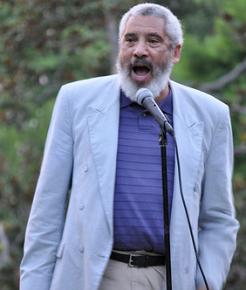D.C. knows racial profiling
reports on a press conference to publicize the findings of a study about the disturbing frequency of racial profiling by Washington, D.C., police.
"THE STUDY only confirmed what we already knew," Reverend Graylan Hagler told the roughly 40 activists and reporters who gathered for a July 31 press conference about a new study documenting the epidemic of racial profiling by police in Washington, D.C.
The study--entitled "Racial Disparities in Arrests in the District of Columbia, 2009-2011"--was released last month by the Washington Lawyers' Committee for Civil Rights and Urban Affairs. It provides statistical evidence for what Black and Brown people in the District of Columbia have learned through bitter experience.
Adding to the outrage, the study was released just as people around the country flooded into the streets following George Zimmerman's acquittal for the murder of Trayvon Martin.
Washington is a city of about 630,000 people. Fifty percent of residents are Black, and 42 percent are white. So while the District is still majority Black, it's no longer the "Chocolate City" it once was during the 1970s when African Americans made up fully 70 percent of the population. Knowing this makes the study's findings even more staggering.

In 2010, there were 40,353 arrests of Black adults--a number equivalent to 17 percent of the entire Black adult population of the District. In contrast, there were 4,866 arrests of white adults in 2010--a number equivalent to 2 percent of the white adult population in the District. Wards with more African American residents witnessed far more arrests. Nine out of 10 individuals arrested for drug offenses were African American. Six out of 10 drug arrests were for simple possession. Eight out of 10 arrests for disorderly conduct were African American or Hispanic.
At the press conference, Andy Shallal, an Iraqi antiwar activist and owner of the restaurant Busboys and Poets, noted the injustice in the sentencing of Floridian Marissa Alexander to 20 years in prison for firing a warning shot to scare off her abusive partner while Zimmerman walked free. Recalling how racism is a systemic issue for a country built on slavery, he concluded by saying, "We are living through a new Jim Crow."
The press conference took place on the steps of the Wilson Building, which is home to the offices of the city council and mayor, and included church leaders such as Hagler, who is the senior minister of the Plymouth Congregational United Church of Christ; business leaders, such as Shallal; city council members; and local activists.
AS THE city is quickly being gentrified, more and more Black and Brown communities are being displaced to other parts of the city or into the surrounding suburbs. "The police department will more and more play the role of displacing people of color," said Rev. Hagler.
Perry Redd, a former city council candidate with the D.C. Statehood Green Party, spoke about the legal discrimination experienced by the formerly incarcerated. He said that D.C. "legally discriminates against 10 percent of the population--because of crimes committed maybe 20 years ago."
Redd described how he himself spent time in prison and then experienced such discrimination at the Department of Parks and Recreations as just one example of how people of color are disproportionately targeted by such "race-neutral policies."
Jamal Muhammed of We Act Radio, a grassroots radio station based in the historically Black neighborhood of Anacostia, inspired the crowd by focusing on the need to keep fighting back. He explained that his "white brothers and sisters need to do something and speak up," and that history shows that such unity is possible, reminding the crowd that the abolitionist movement included both white and Black opponents of slavery. Racism today may have a "new face," but it's still the "same disease," said Muhammed.
Even Tommy Wells, the Capitol Hill city council member and mayoral candidate, came out to speak. He is currently the chair of the Judiciary Committee and has been pushing to decriminalize marijuana in the District of Columbia, which would be one part of ending the disastrous "war on drugs" that has led to the mass incarceration of Black and Brown people for nonviolent drug offenses.
But it's worth noting the clash between Wells' support on the question of racial profiling and other criminal justice issues and his recent vote against D.C.'s living wage bill. He was one of the five city council members who opposed the measure, which is aimed at holding Wal-Mart, which is building stores in the District, to its promise to pay workers a living wage.
This study is one aspect of igniting a larger fight against racism in the District. Town-hall meetings are happening around the city to publicize the results of the study and getting reactions from the community. As the Zimmermans of this world continue to get away with murder, it's our job to fight back against the racist justice system.
And on August 24 when thousands come to D.C. to celebrate the 50th anniversary of the 1963 March on Washington, activists are calling for a feeder march specifically organized around opposition to the New Jim Crow. All those interested in showing their support for our demand to end racial profiling by the D.C. police should join us at 9 a.m. on August 24. In the words of Reverend Hagler, "We got a struggle before us today."


